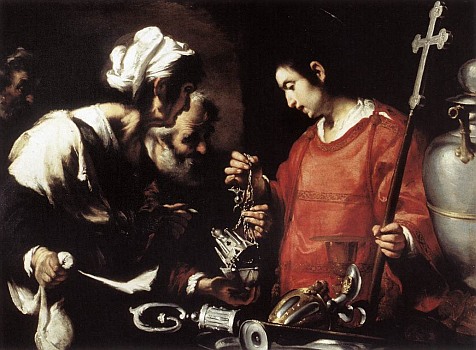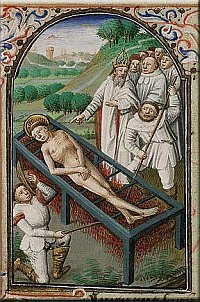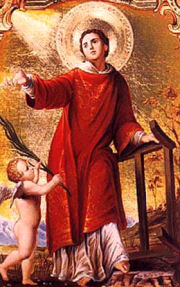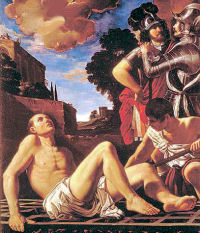The Feast
of St. Lawrence

| In August of A.D. 258, the emperor Valerian ordered that all deacons, priests, and Bishops be put to death. Tradition via the Golden Legend tells us that Pope Sixtus II met with Lawrence, saying to him: "I shall not leave thee, my son, but greater strifes and battles be due to thee for the faith of Jesu Christ. We, as old men, have taken more lighter battle, and to thee as to a young man shall remain a more glorious battle of which thou shalt triumph and have victory of the tyrant, and shalt follow me within three days." Pope Sixtus II's martyrdom was followed three days later by that of Lawrence, the last of the deacons of Rome to be executed. He was put to death by being roasted on a gridiron over a fire. The Golden Legend, written in A.D. 1275 by Jacobus de Voragine, Archbishop of Genoa, gives us this account:
St. Lawrence was buried in the Catacomb of Cyriaca, on the Via Tiburtina. Constantine the Great built a chapel there in his honor, and this chapel was built up over the years, becoming known as St. Lawrence-Outside-The-Walls (San Lorenzo fuori le Mura), one of the original seven patriarchal basilicas of Rome. Another church, San Lorenzo in Panisperna, was built at the place of his martyrdom. In this latter church, one can venerate the gridiron upon which St. Lawrence was put to death.
Customs and TraditionsTonight, or especially tomorrow night and up to the dawn of 12 August, 1 if you look up at a clear sky in the Northern hemisphere, you may be blessed to see the Perseid meteor shower, 2 debris of the comet Swift-Tuttle whose "radiant" (point of apparent origin) is in the constellation of Perseus. This meteor shower is known as "the tears of St. Lawrence" because it is most visible at this time of year, though these streaks of light can sometimes be seen as early as 17 July and as late as 24 August.
To see St. Lawrence's "fiery tears," go outside after midnight, to a place as far away as possible from city lights (leave the city, if possible, and drive toward the constellation so that the city lights' glow will be behind you). Lie down on the grass and look up and toward the North, about halfway between the constellation Perseus 3 -- which will be very, very low on the horizon to the northeast -- and the point directly overhead. Scan the sky elsewhere, too, but this area will be the most likely place to see the meteors. If the sky is too cloudy or the Moon is too full (see at right) for you to get a good view of the stars, you might not have any luck at all -- but there will always be next year to try again! O Lord our Governour, how excellent is thy Name in all the world; Thou hast set Thy glory above the heavens! Out of the mouth of very babes and sucklings hast Thou ordained strength, because of Thine enemies, that Thou mightest still the enemy and the avenger. For I will consider Thy heavens, even the works of Thy fingers; the moon and the stars which Thou hast ordained. As to foods, there is nothing in particular associated with this day that I am aware of -- but, given St. Lawrence's mode of death, a barbecue seems a very natural choice. Grill some meats and vegetables, have a nice cooler of beer, and prepare for a late night of star-gazing and recalling the glory of St. Lawrence! |
 And the ministers despoiled him, and laid him stretched out upon a gridiron of iron, and laid burning coals under, and held him with forks of iron. Then said Laurence to Valerianus: Learn, thou cursed wretch, that thy coals give to me refreshing of coldness, and make ready to thee torment perdurable, and our Lord knoweth that I, being accused, have not forsaken him, and when I was demanded I confessed him Christ, and I being roasted give thankings unto God.
And the ministers despoiled him, and laid him stretched out upon a gridiron of iron, and laid burning coals under, and held him with forks of iron. Then said Laurence to Valerianus: Learn, thou cursed wretch, that thy coals give to me refreshing of coldness, and make ready to thee torment perdurable, and our Lord knoweth that I, being accused, have not forsaken him, and when I was demanded I confessed him Christ, and I being roasted give thankings unto God. 

 This young deacon and heroic martyr is numbered among those saints who were most highly venerated by the ancient Roman Church. Next to the feast of Sts. Peter and Paul, that of St. Lawrence ranked highest in the Roman sanctoral cycle. "From the rising of the sun unto its setting," says St. Leo, "whenever the glory of Levites beams forth in splendor, Rome is deemed no less illustrious because of Lawrence than Jerusalem because of Stephen."
This young deacon and heroic martyr is numbered among those saints who were most highly venerated by the ancient Roman Church. Next to the feast of Sts. Peter and Paul, that of St. Lawrence ranked highest in the Roman sanctoral cycle. "From the rising of the sun unto its setting," says St. Leo, "whenever the glory of Levites beams forth in splendor, Rome is deemed no less illustrious because of Lawrence than Jerusalem because of Stephen."  Lawrence was tortured, scourged, and scorched with glowing plates. In the midst of excruciating pain he prayed: "Lord Jesus Christ, God from God, have mercy on Your servant!" And he besought the grace of faith for the bystanders. At a certain point the soldier Romanus exclaimed: "I see before you an incomparably beautiful youth. Hasten and baptize me." He had observed how an angel dried the wounds of Lawrence with a linen cloth during his passion.
Lawrence was tortured, scourged, and scorched with glowing plates. In the midst of excruciating pain he prayed: "Lord Jesus Christ, God from God, have mercy on Your servant!" And he besought the grace of faith for the bystanders. At a certain point the soldier Romanus exclaimed: "I see before you an incomparably beautiful youth. Hasten and baptize me." He had observed how an angel dried the wounds of Lawrence with a linen cloth during his passion.